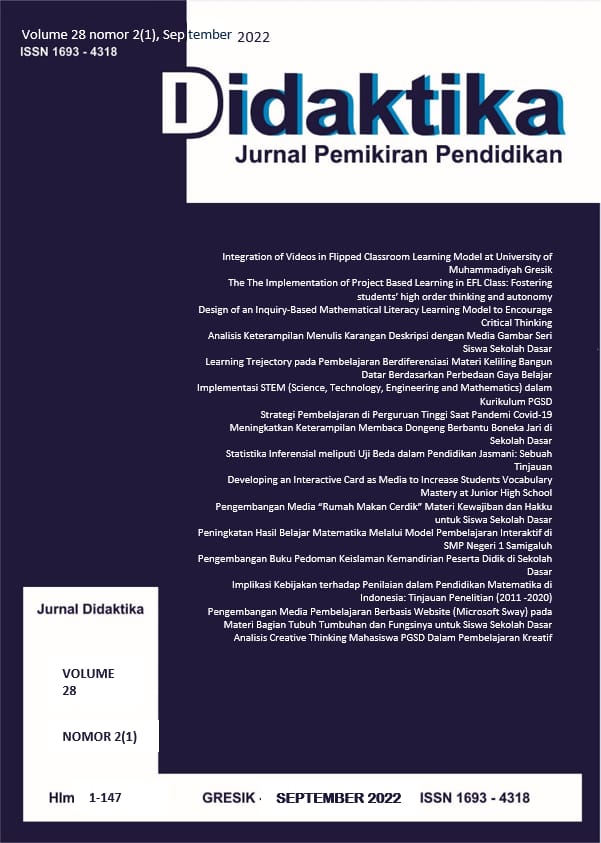Strategi Pembelajaran di Perguruan Tinggi Saat Pandemi Covid-19
DOI:
https://doi.org/10.30587/didaktika.v28i2.4483Abstract
Pembelajaran jarak jauh mulai diterapkan diberbagai instansi Pendidikan dalam pelaksanaan proses belajar mengajar. Pembelajaran Jarak jauh di terapkan agar supaya bisa mengurangi aktifitas pengumpulan masa ataupun pertemuan-pertemuan yang menuntut kontak fisik dalam proses pembelajaran konvensional. Program Studi PGSD di Universitas Muhammadiyah Gresik juga telah melaksanakan pembelajaran jarak jauh tersebut dengan bantuan aplikasi pihak ke tiga yang beraneka ragam. Spada, Edmodo, Whatsapp Grup dan lainnya adalah contoh aplikasi yang lazim digunakan di prodi PGSD ini. Aplikasi tambahan untuk tatap muka virtual juga disediakan, diantaranya Zoom meeting. Aplikasi Zoom meeting ini dipilih karena selain mudah dalam pengoperasiannya, aplikasi ini juga lebih lengkap dan bisa mengakomodasi hampir semua kegiatan proses belajar mengajar. Meski demikian, tetap saja banyak kendala yang dihadapi saat melaksanakan pembelajaran daring. Sulitnya akses sinyal internet, baik untuk dosen maupun mahasiswa menjadi salah satu kendalanya. Kendala yang lain yakni kuota internet yang terbatas, sulitnya diskusi secara virtual, waktu pembelajaran yang terlalu fleksibel hingga malam hari, ataupun tugas yang diberikan sebagai pengganti pertemuan virtual juga menjadi kendala tersendiri bagi mahasiswa. Banyak mahasiswa yang memilih untuk segera melaksanakan pembelajaran luring meski dengan menerapkan protocol Kesehatan yang sangat ketat. Mahasiswa merasa bahwa mereka lebih mudah bila belajar secara langsung atau luring dibanding pembelajaran daring atau online. Melalui penelitian ini, peneliti ingin melihat strategi pembelajaran di perguruan tinggi di masa pandemic covid-19. Penelitian ini bersifat deskriptif kualitatif berlandaskan filsafat post positivism yang digunakan untuk meneliti kondisi objek yang alamiah dimana peneliti sebagai instrument kunci dan hasil penelitiannya lebih menekankan makna daripada generalisasi (Sugiyono, 2009). Teknik pengumpulan data dilakukan dengan wawancara secara langsung kepada dosen dan juga mahasiswa prodi PGSD Universitas Muhammadiyah Gresik. Subyek penelitian ini sendiri adalah dosen dan mahasiswa PGSD Universitas Muhammadiyah Gresik yang dipilih secara acak sebanyak 15 Mahasiswa. Hasil penelitian ini, diharapkan dapat menunjukkan gambaran strategi pembelajaran di perguruan tinggi mahasiswa prodi PGSD Universitas Muhammadiyah Gresik.
Downloads
Published
How to Cite
Issue
Section
License
License and Copyright Agreement
In submitting the manuscript to the journal, the authors certify that:
- They are authorized by their co-authors to enter into these arrangements.
- The work described has not been formally published before, except in the form of an abstract or as part of a published lecture, review, thesis, or overlay journal.
- That it is not under consideration for publication elsewhere,
- That its publication has been approved by all the author(s) and by the responsible authorities – tacitly or explicitly – of the institutes where the work has been carried out.
- They secure the right to reproduce any material that has already been published or copyrighted elsewhere.
- They agree to the following license and copyright agreement.
Copyright
Authors who publish with DIDAKTIKA: Jurnal Pemikiran Pendidikan agree to the following terms:
- Authors retain copyright and grant the journal right of first publication with the work simultaneously licensed under a Creative Commons Attribution License (CC BY-SA 4.0) that allows others to share the work with an acknowledgment of the work's authorship and initial publication in this journal.
- Authors are able to enter into separate, additional contractual arrangements for the non-exclusive distribution of the journal's published version of the work (e.g., post it to an institutional repository or publish it in a book), with an acknowledgment of its initial publication in this journal.
- Authors are permitted and encouraged to post their work online (e.g., in institutional repositories or on their website) prior to and during the submission process, as it can lead to productive exchanges, as well as earlier and greater citation of published work.
Licensing for Data Publication
Open Data and Software Publishing and Sharing
The journal strives to maximize the replicability of the research published in it. Authors are thus required to share all data, code or protocols underlying the research reported in their articles. Exceptions are permitted but have to be justified in a written public statement accompanying the article.
Datasets and software should be deposited and permanently archived inappropriate, trusted, general, or domain-specific repositories (please consult http://service.re3data.org and/or software repositories such as GitHub, GitLab, Bioinformatics.org, or equivalent). The associated persistent identifiers (e.g. DOI, or others) of the dataset(s) must be included in the data or software resources section of the article. Reference(s) to datasets and software should also be included in the reference list of the article with DOIs (where available). Where no domain-specific data repository exists, authors should deposit their datasets in a general repository such as ZENODO, Dryad, Dataverse, or others.
Small data may also be published as data files or packages supplementary to a research article, however, the authors should prefer in all cases a deposition in data repositories.











